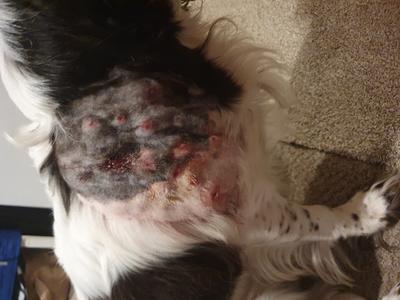Multiple Abscesses on Dog Not Healing
by Anonymous
My dog had developed multiple abscesses on his shoulder (or a singular abscesses that is creating several tracts of infection). These have been treated by 3 types of antibiotics (to which they haven't responded), have been lanced and flushed and an xray has ruled out a foreign object. However they are not healing and appear to be further spreading. There was no obvious initial skin trauma such as a dog bite or obvious puncture from a sharp object.
Could there be a more serious underlying cause?
Editor Suggestion For Possible Causes of Abscesses on Shoulder
So sorry to hear about your dogs skin condition.
The image shows a dog's shoulder area with what appears to be a large, open wound with multiple inflamed tracts. The tissue looks inflamed and there's evident skin destruction, possibly with draining tracts suggesting a severe and persistent infection or other process.
Given the history and lack of response to antibiotics and lancing, here are some possible underlying causes:
Resistant Bacterial Infection: The infection might be due to antibiotic-resistant bacteria. Culturing the bacteria to identify the specific type and its antibiotic sensitivities would be a critical step.
Consult your veterinarian about getting a culture and sensitivity test done to guide the most appropriate antibiotic therapy.
Fungal Infection: Some fungal infections
Fungal cultures or biopsies might be necessary to diagnose and treat with appropriate antifungal medications.
Immunodeficiency Disorders: An underlying immune disorder could be preventing healing.
Blood work and further diagnostics to assess the dog's immune function might be advised.
Foreign Material: Although an X-ray has ruled out a foreign object, some materials, like plant awns, may not be visible on X-rays.
Further imaging, such as an ultrasound or MRI, may be useful in such cases.
Neoplasia: In rare cases, a cancerous process can present as a non-healing wound.
A biopsy of the affected area may be warranted to rule out neoplasia.
Autoimmune Disease: Autoimmune skin diseases can also present with non-healing wounds.
A biopsy along with specific blood tests can help diagnose autoimmune conditions.
As you can see, in cases with several potential causes, it is important to work closely with your veterinarian in-person, possibly a veterinary dermatologist or an internal medicine specialist, for more advanced diagnostics and treatment plans.
Please keep us up to date on your dog's condition.
Jeff
Editor and Publisher
Dog Health Guide
Please note: This information is intended to complement, not replace, the advice of your pet's veterinarian. Always consult a vet for professional medical advice about your pet's health.
Join in and write your own page! It's easy to do. How? Simply click here to return to Abscess.


